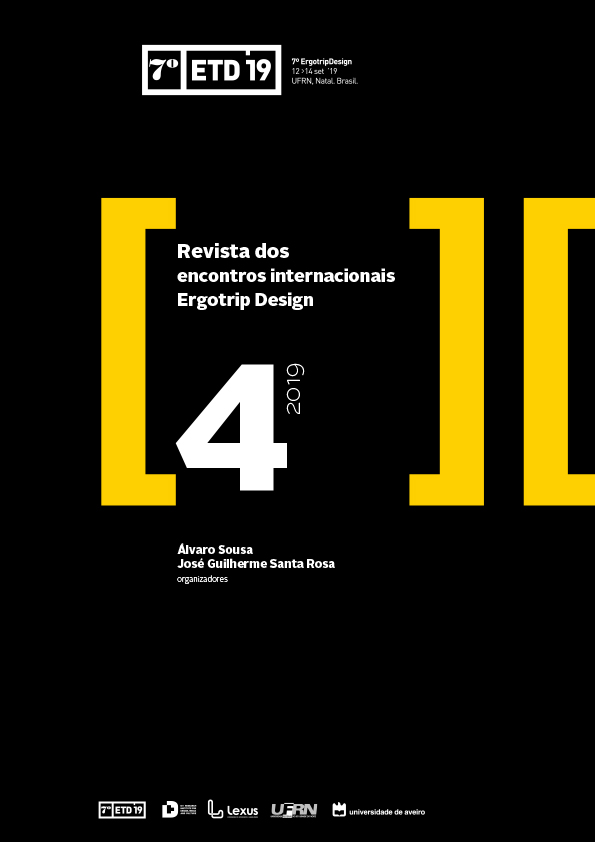O trabalho de UI/UX Design no desenvolvimento de uma plataforma de recrutamento no setor do turismo em Portugal
Resumo
Neste artigo é apresentado o trabalho de Design de Comunicação realizado na criação da plataforma Groow Tourism. Esta plataforma digital tem como principal objetivo o apoio à gestão de recursos humanos no turismo. Neste sector as atividades variam e a sazonalidade do emprego é uma tendência crescente.
Com a plataforma Groow Tourism pretende-se aproximar candidatos e recrutadores, ajudando-os na delimitação do perfil de trabalhador pretendido, no sentido de reconhecer os candidatos que apresentam as competências mais adequadas para as diferentes empresas. Pretende-se, igualmente, tornar mais eficazes os processos de recrutamento e seleção de candidatos neste setor do turismo.
Em resposta ao objetivo de desenvolvimento desta plataforma digital, esta investigação passou por: aplicar os métodos associados aos princípios do Interaction Design; o estudo do UX e do UI design; a aplicação do método personas; a criação de workflows e wireframes; e o desenvolvimento de testes de usabilidade, que permitiram otimizar a prototipagem final deste projeto.
Referências
Babich, N. (2017). 10 Tips On Typography in Web Design. Consultado em Maio 26, 2018, em: http://babich.biz/typography-for-web/
Baum, T. (2015). Human resources in tourism: Still waiting for change? - A 2015 reprise. Tourism Management, 50, 204–212.
Cooper, A., Reimann, R., & Cronin, D. (2007). About Face 3: The essentials of interaction design. Information Visualization (Vol. 3). Canada: Wiley Publishing, Inc.
Dam, R., & Siang, T. (2018). Personas – A Simple Introduction _ Interaction Design Foundation. Disponível em: https://www.interaction-design.org/literature/article/personas-why-and-how-you-should-use-them
Don, A., & Petrick, J. (2003). User Requirements by Any Means Necessary. In B. Laurel (Ed.), Design Research Methods and Perspectives (pp. 70–80). London, England: The MIT Press.
Getz, D., & Page, S. J. (2015). Progress and prospects for event tourism research. Tourism Management, 52, 593–631. Disponível em: http://dx.doi.org/10.1016/j.tourman.2015.03.007
Interaction Design Foundation. (2018). What is Aesthetics? Consultado em Maio 20, 2018, em: https://www.interaction-design.org/literature/topics/aesthetics
Kastenholz, E., & Lopes de Almeida, A. (2008). Seasonality in rural tourism – the case of North Portugal. Tourism Review, 63(2), 5–15. Disponível em: http://www.emeraldinsight.com/doi/10.1108/16605370810883905
Koenig-Lewis, N., & Bischoff, E. E. (2010). Developing effective strategies for tackling seasonality in the tourism industry. Tourism and Hospitality, Planning and Development, 7(4), 395–413.
Morton, J. (2010). Why Color Matters. Consultado em Maio 24, 2018, em: https://www.colorcom.com/research/why-color-matters
Morville, P. (2004). User Experience Design. Consultado em Fevereiro 27, 2018, em: http://semanticstudios.com/user_experience_design/
Nielsen, J. (2012). Usability 101: Introduction to Usability. Consultado em Abril 8, 2018, em: https://www.nngroup.com/articles/usability-101-introduction-to-usability/
Norman, D., & Nielsen, J. (2018). The Definition of User Experience. Consultado em Março 30, 2018, em: https://www.nngroup.com/articles/definition-user-experience/
Roose, K. (2018). Google Is Designing the Font of the Future. Here’s How. Consultado em Abril 24, 2018, em: http://nymag.com/daily/intelligencer/2014/07/google-is-designing-the-font-of-the-future.html
Tidwell, J. (2011). Designing Interfaces. (M. Treseler, Ed.) (2nd ed.). O’REILLY.
UNWTO. (2014). Global Report on Shopping Tourism. Disponível em: http://affiliatemembers.unwto.org/publication/global-report-shopping-tourism
Direitos de Autor (c) 2020 Revista dos encontros internacionais Ergotrip Design

Este trabalho está licenciado com uma Licença Creative Commons - Atribuição 4.0 Internacional.





